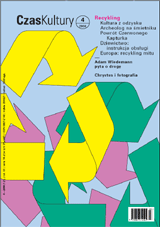Jakie to europejskie!
How European!
Author(s): Péter ZilahySubject(s): Cultural Essay, Political Essay, Societal Essay
Published by: Stowarzyszenie Czasu Kultury
Keywords: A broad history of European unions; Openness as a challenge for modern Europe; Emotional European citizenship; Being European as a matter of Feeling; mythological seduction of Europa
Summary/Abstract: What is the significance of modern Europe’s integration? The exciting history of the continent reveals a diversity of political unions. It often happened that great powers like Britain, France and Russia (or even Poland) aspired to unite the continent under their hegemony. The activities, for example, of France and Spain led to interesting cultural combinations whilst other ventures, like the Polish and Lithuanian Union or the Austro-Hungarian Monarchy ended in a fiasco. It does not take too much insight to say that the key to solving the problems of Europe today is openness. “Europe has to remain open; otherwise it might close up completely”, says Péter Zilahy. Nurturing an inferiority complex and waiting for the assistance of stronger (western) neighbours without having their own visions will lead to a vicious circle for eastern countries and intensifying the threat of regression. The restoration of full European identity has become an extremely urgent issue. “The fact that we are European cannot be a source of irrational fear.” It is necessary to confront the demons of the past in a creative way. In a certain sense the dramas of the 20th century led to the death of Europe: instead of a sense of brotherhood the prevailing driving force was a selfish concern about one’s own “back yard”. “All these demons are still around and every now and then a grave is opened.” Consolidating and healing European consciousness will additionally help overcome the recently growing fear of eastern fundamentalism. Despite the fact that Péter Zilahy talks about very serious issues, he displays a sense of humour which introduces a specific lightness to the text. Obviously, the challenges related to integration are very important, but the author declares that “in general, it is not difficult to be European; for example I don’t really have to do anything apart from writing something from time to time.” Nevertheless, the fact of being European, which is so easily noticed outside the continent, should be accompanied by a deep feeling: one that is real and mature instead of being possessive and merely determined by a narrow-minded attachment to an area of land. The mythological Europa was seduced by Zeus. The Europe of today needs a new amorous passion. Will the European Union stand up to these challenges?
Journal: Czas Kultury
- Issue Year: 2004
- Issue No: 04
- Page Range: 39-47
- Page Count: 9
- Language: Polish
- Content File-PDF

